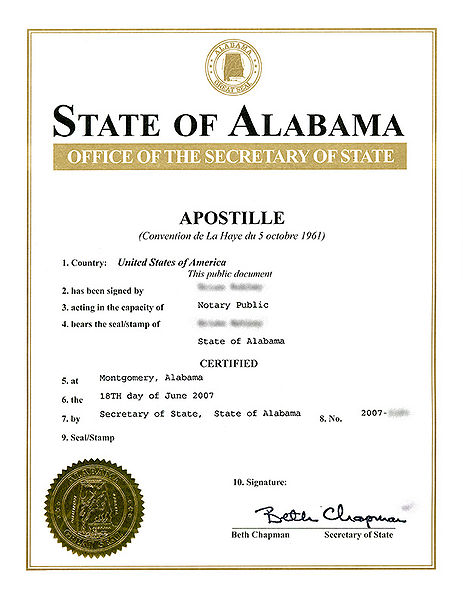Recognizing the Apostille Process: A Comprehensive Guide to International Document Verification
Browsing the elaborate landscape of international document verification can be discouraging without a clear understanding of the apostille procedure. This overview thoroughly lays out the essential actions, from determining which papers call for accreditation to submitting them for verification by the Competent Authority. Realizing the significance of an apostille and recognizing possible mistakes, such as incomplete submissions and language barriers, can significantly improve the authentication trip. What precisely specifies an apostille, and why is it so crucial for papers predestined for Hague Convention countries? These concerns develop the structure of our exploration into this important lawful procedure.
What Is an Apostille?
An apostille is a main certification that confirms the authenticity of a document for usage in one more nation. This accreditation, released by a designated authority in the nation where the record stemmed, ensures that the paper is recognized as valid and legit in the global field. The procedure of obtaining an apostille entails numerous actions, including the confirmation of the paper's signatures, seals, and stamps by ideal governmental bodies.
The apostille functions as an internationally identified form of authentication, implemented by the Hague Convention of 1961. This treaty, formally recognized as the Hague Convention Eliminating the Need of Legalisation for Foreign Public Papers, standardizes the procedure of document accreditation among participant countries. The apostille itself is a standard certification which contains certain details, such as the providing authority, the native land, and the date of issuance.
It is very important to note that not all documents are qualified for an apostille. Commonly, public papers like copyright, marital relationship licenses, court orders, and academic diplomas receive this accreditation. Exclusive files, such as agreements and contracts, might require registration and additional steps to certify.
Significance of Apostille
Recognizing what an apostille is sets the stage for valuing its importance in global transactions. houston tx apostille. An apostille, basically a form of accreditation issued by a marked authority, validates the credibility of a file for usage in foreign nations that are signatories to the Hague Apostille Convention. This standard process eliminates the demand for further legalisation by embassies or consular offices, thus streamlining worldwide transactions
The significance of an apostille can not be overstated. It ensures the reliability and acceptance of important documents-- such as birth certifications, marriage licenses, and instructional diplomas-- across boundaries. For businesses, it promotes the smooth conduct of worldwide trade, mergers, and procurements by offering a relied on approach read this article of document confirmation. This decreases governmental obstacles, saving both time and sources.
Moreover, an apostille boosts legal safety and security and compliance. Governments and establishments can with confidence count on the credibility of records birthing an apostille, reducing the risk of fraud and misstatement.
Papers That Need Apostille
When taking part in global purchases or lawful issues, specific papers commonly necessitate the verification provided by an apostille. This guarantees their recognition and acceptance in nations that are notaries to the Hague Apostille Convention. Commonly, personal records such as birth certifications, marriage certificates, and fatality certificates need an apostille, especially when they are made use of for processes like migration, marital relationship abroad, or worldwide probate issues.
Educational documents are an additional classification often needing apostilles. Diplomas, transcripts, and scholastic documents frequently require this verification for functions such as seeking more education, employment, or expert licensing in an international country (houston tx apostille). This step guarantees that sites the files are acknowledged as legit and legitimate
Lawful papers, consisting of powers of lawyer, testimonies, and court orders, additionally commonly necessitate apostilles. Business files such as certificates of incorporation, bylaws, and commercial contracts may require an apostille to help with global profession, develop foreign branches, or take part in cross-border legal proceedings.
Steps to Get an Apostille

Getting an apostille involves a multi-step procedure that ensures the authenticity and acceptance of your files in international countries. The preliminary action is recognizing which files need an apostille. houston tx apostille. Typical documents include copyright, marriage licenses, academic transcripts, and business records
When determined, the file should be licensed by the suitable releasing authority. After certification, the document must be submitted to the marked Competent Authority in the paper's country of beginning.
The entry procedure usually needs a completed application, the initial paper, and a charge. Some try this out jurisdictions may use the option of expedited handling for an additional charge. Upon effective verification, the Competent Authority will certainly affix the apostille certification to the document, consequently confirming its authenticity.
Usual Difficulties and Solutions
Browsing the apostille process can offer a number of common challenges that, otherwise appropriately attended to, may delay or make complex document authentication. One constant issue is the entry of incorrect or insufficient documents. Each country has details requirements for the kinds of files that can be apostilled, and any type of deviation from these can lead to denial. Guaranteeing that all documents are precise and full before entry is important.
Another common difficulty is recognizing the diverse handling times. Handling times can vary substantially in between nations and even in between various areas within the very same nation. It is vital to make up these variations when planning the apostille procedure to stay clear of unexpected delays.
Furthermore, language barriers can posture significant obstacles. Files in a foreign language typically call for qualified translations, and any type of errors in translation can result in further complications. Involving a professional translation service can mitigate this risk.

Final Thought
Mastering the apostille procedure considerably boosts the effectiveness of global file verification. By comprehending the need of determining and licensing needed documents, and navigating the entry to the Competent Authority, the process comes to be much more convenient.